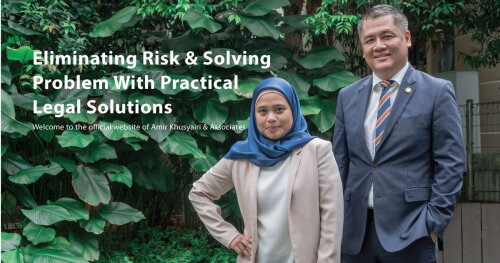Best Debt Capital Markets Lawyers in Shah Alam
Share your needs with us, get contacted by law firms.
Free. Takes 2 min.
List of the best lawyers in Shah Alam, Malaysia
About Debt Capital Markets Law in Shah Alam, Malaysia
Debt Capital Markets (DCM) are an essential part of the Malaysian financial system, facilitating the raising of funds for governments, corporations, and other entities through the issuance of various debt instruments. In Shah Alam, which lies within the state of Selangor, the DCM sector is subject to both national regulations and local jurisdictional considerations. Common instruments used in this market include bonds, sukuk (Islamic bonds), notes, and other fixed income securities. Proper legal oversight is necessary to ensure compliance with regulations, manage risks, and structure transactions according to best practices, especially given Malaysia's dual conventional and Islamic finance systems.
Why You May Need a Lawyer
The complexities of Debt Capital Markets often require expert legal assistance. Individuals and entities may require a lawyer for reasons such as:
- Structuring and documentation of bond or sukuk issuances. - Navigating regulatory approval processes with authorities like the Securities Commission Malaysia. - Conducting due diligence for local and cross-border transactions. - Ensuring compliance with Shariah law for Islamic debt instruments. - Handling disputes related to defaults or restructuring. - Advising on tax implications of debt instruments. - Ensuring fair disclosure and transparency in public offerings. - Assisting with private placements and listing of debt securities. - Reviewing agreements and prospectuses. In all these scenarios, a lawyer can help protect your interests and minimize exposure to legal risks.
Local Laws Overview
In Shah Alam, Malaysia, the regulation of Debt Capital Markets primarily falls under federal laws and guidelines issued by key regulatory bodies. Significant pieces of legislation and regulatory requirements include:
- Capital Markets and Services Act 2007 (CMSA): Governs issuance, offering, and trading of debt securities. - Securities Commission Malaysia (SC): Regulates all aspects of capital market activities, including approvals for public and private debt offerings. - Financial Services Act 2013 and Islamic Financial Services Act 2013: These cover the conventional and Islamic finance sectors, respectively. - Bursa Malaysia: Oversees listing and trading of debt securities on the exchange. - Guidelines on Sukuk and Bonds: SC issues specific guidelines for structuring and issuing sukuk and bonds, including requirements for Shariah compliance. - Local Government Requirements: For specific types of financing, especially those relating to infrastructure in Shah Alam, local council approval and compliance may be required. These laws and requirements ensure the integrity, transparency, and stability of the Debt Capital Markets.
Frequently Asked Questions
What is a debt instrument in the context of Malaysia's capital markets?
A debt instrument is a financial tool used by entities to raise capital by borrowing funds from investors. Common examples include bonds and sukuk. In exchange for their investment, holders receive interest or periodic payments and are repaid the principal at maturity.
What is the difference between a bond and a sukuk?
Bonds are conventional debt securities that pay interest, while sukuk are Islamic financial certificates structured to comply with Shariah law, which prohibits interest. Sukuk typically represent ownership of an asset or a pool of assets.
Who regulates the issuance of bonds and sukuk in Shah Alam?
The Securities Commission Malaysia (SC) is the primary regulator for the issuance and offering of debt securities, including bonds and sukuk, countrywide, which includes Shah Alam.
What approvals are required before issuing a bond or sukuk?
An issuer must typically submit an application to the Securities Commission Malaysia for approval. This includes a prospectus, supporting documents, and Shariah board endorsement for sukuk when applicable.
Can foreign entities issue debt securities in Malaysia?
Yes, foreign entities can issue debt securities in Malaysia, subject to compliance with local regulatory requirements and sometimes additional approvals from the central bank or the Securities Commission.
What are disclosure requirements for public debt offerings?
Issuers must provide full, fair, and accurate disclosure of all material facts relating to the offering within the prospectus. This helps protect investors and ensures transparency in the market.
How does bankruptcy or restructuring affect bondholders or sukukholders?
In the event of bankruptcy or restructuring, bondholders or sukukholders have rights as creditors and may receive repayments according to the terms specified in the contract and relevant legal provisions. Lawyers can assist in asserting and protecting these rights.
What is the process for listing debt securities on Bursa Malaysia?
To list debt securities on Bursa Malaysia, issuers must meet certain eligibility criteria set out by the exchange, submit requisite documentation, and comply with ongoing reporting obligations. Legal counsel can ensure all requirements are met.
What are common risks in investing in Debt Capital Markets?
Risks include credit/default risk, interest rate risk, market risk, liquidity risk, and legal or regulatory risk. Understanding and mitigating these risks may require professional legal and financial advice.
How does Malaysian law address Islamic finance requirements in debt instruments?
Malaysian law supports Islamic finance through specific statutes and guidelines. All sukuk issuances must be endorsed by a Shariah board to ensure compliance with Islamic principles.
Additional Resources
- Securities Commission Malaysia (SC): Regulatory body for capital markets oversight. - Bursa Malaysia: Stock exchange for listing and trading of debt securities. - Bank Negara Malaysia (Central Bank): Regulatory input for certain cross-border or large transactions. - Association of Corporate Treasurers Malaysia: Training and resources for market participants. - Malaysian Rating Corporation Berhad (MARC) and RAM Ratings Services Berhad: Agencies providing credit ratings for debt instruments. - Local law firms in Shah Alam with capital markets or Islamic finance expertise. - Selangor State Government: For infrastructure-related financing within Shah Alam.
Next Steps
If you believe you need legal assistance relating to Debt Capital Markets in Shah Alam, consider the following steps: 1. Gather relevant documents and information about your situation, such as current or planned debt instruments, contracts, or queries. 2. Identify the specific legal or regulatory issue you are facing, whether it is structuring an issuance, regulatory compliance, dispute resolution, or something else. 3. Consult with a lawyer experienced in capital markets, debt securities, or Islamic finance. If possible, seek lawyers based in or familiar with Shah Alam. 4. Ask about relevant experience, proposed solutions, and fee structures. 5. Follow your lawyer’s advice regarding next actions, which may include further due diligence, securing regulatory approvals, preparing documents, or engaging with counterparties. Taking early and informed action can help safeguard your interests and facilitate successful engagement with the Debt Capital Markets in Shah Alam.
Lawzana helps you find the best lawyers and law firms in Shah Alam through a curated and pre-screened list of qualified legal professionals. Our platform offers rankings and detailed profiles of attorneys and law firms, allowing you to compare based on practice areas, including Debt Capital Markets, experience, and client feedback.
Each profile includes a description of the firm's areas of practice, client reviews, team members and partners, year of establishment, spoken languages, office locations, contact information, social media presence, and any published articles or resources. Most firms on our platform speak English and are experienced in both local and international legal matters.
Get a quote from top-rated law firms in Shah Alam, Malaysia — quickly, securely, and without unnecessary hassle.
Disclaimer:
The information provided on this page is for general informational purposes only and does not constitute legal advice. While we strive to ensure the accuracy and relevance of the content, legal information may change over time, and interpretations of the law can vary. You should always consult with a qualified legal professional for advice specific to your situation.
We disclaim all liability for actions taken or not taken based on the content of this page. If you believe any information is incorrect or outdated, please contact us, and we will review and update it where appropriate.











